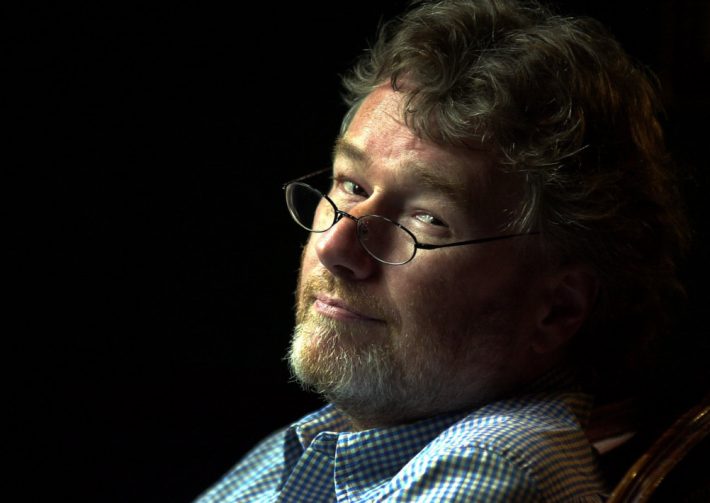Today marks five years since Iain Banks, known to fans of his science fiction novels as Iain M. Banks, died of cancer. By the time of his death, he’d become one of the most respected authors in the genre. His series of novels set in the Culture universe pushed the envelope for what utopian futures could be imagined to look like in a time when dystopian futures continue to be more popular in fiction. Using his novels, he examined everything from interventionism to isolationism to communism to feudalism through the perspectives of his marquee Culture citizens and an assortment of characters living on the fringes of the meta-civilization.
He was born in Fife, Scotland in 1954. His mother was an ice skater and his father worked in the Navy. Early in his life, he was introduced to science fiction through a series of children novels about a character named Kemlo and his space adventures. Reading the series propelled him toward picking up a pen himself and writing stories about space-faring thrill-seekers. He worked day jobs in his twenties that allowed him ample time to work on his craft.
Before publishing his first novel in the Culture series, he started with The Wasp Factory in 1984. At the time, he was unable to get his novels published and so decided to try his hand at literary fiction. Three more novels followed in the mid-eighties before he was able to publish his first science fiction work as a professional author. Consider Phlebas was released in 1987. It was the first real glimpse into Banks’s galaxy-spanning imagination and the world’s introduction to the people of the Culture – a space-faring, post-scarcity, anarcho-communist meta-civilization with sentient spaceships and technology that allowed its average citizen freedom to transfer their consciousness between a wide variety of hosts and substrates.
Consider Phlebas notably spends very little time with citizens of the Culture and instead follows the travails of an outsider existing on the margins and none too impressed with the Culture’s way of life. Banks would revisit this template for a few more entries in the series. In interviews, he said of this decision that due to the lack of scarcity and relatively low-level of conflict marring the day-to-day existence of the average Culture citizen, stories set inside the Culture proper would be boring and very quickly run out of steam. On its face, this might read as a bit of a cop-out but one thing this decision allowed for was an honest examination of the contradictions such a civilization might have to live with and those contradictions tended to be most visible on the margins. The Culture is on the whole a leisurely people so removed from trappings we currently have to contend with that their definition of words like ‘vacation’ are starkly different from ours. When viewed from the margins however, complications abound.
Consider Phlebas begins with the Culture at war with the Idiran civilization and that war ends up looming large over events covered throughout the series. The average Culture citizen abhors war and the decision to go to war seems to have caused a schism so significant, some citizens leave to join something called the Culture Ulterior. While the Culture exists without anything resembling a state or laws governing how its citizens live their lives, it somehow manages to be saddled with something called Special Circumstances. It is the business of Special Circumstances to decide how to proceed once relations between the Culture and an alien civilization have progressed beyond the Culture’s moral capacity. In Consider Phlebas, it spells all-out war and only on the margins do we get to see the full implications of these decisions play out.
In Culture novels like Use of Weapons, Look to Windward, Matter, and Surface Detail, the outsider’s perspective on the people of the Culture range from reactions of disbelief to fascination to outright hatred. Slavoj Zizek, a frequent critic of capitalism, once said it’s easier to imagine the end of life on Earth than it is to imagine the end of capitalism. The Culture, having rid itself of capitalism millennia ago, is a phenomenon that lives often outside the realm of believability for many of its neighboring civilizations. On the same token, through its foreign affairs outfits like Contact and Special Circumstances, we see it still getting mired in diplomatic rigmaroles similar enough to what we observe in reality and feel powerless against. It’s no accident that Banks chose to focus the majority of his foray into this world he so painstakingly built on the affairs of Special Circumstances.
Banks was, for all intents and purposes, a leftist. At various points in his life, he supported Scottish Independence, opposed Tony Blair, opposed the Iraq War, supported the Boycott, Divestments, and Sanctions campaign, and endorsed the Scottish Socialist Party. The same contradictions inherent within our current political climate with regards to issues like the Israeli occupation of Gaza and America’s habit of arming foreign agents who’s actions lead to mass genocide, would play out time and time again in his works.
Iain Banks is remembered for having the creative wherewithal to imagine a world without capitalism. He should also be remembered specifically for his views on our current state of affairs and the efforts he made, through his books, to hold a mirror up to it.
